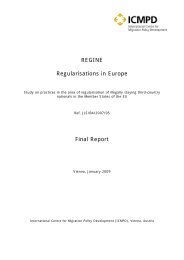taxud/2414/08 - European Commission - Europa
taxud/2414/08 - European Commission - Europa
taxud/2414/08 - European Commission - Europa
You also want an ePaper? Increase the reach of your titles
YUMPU automatically turns print PDFs into web optimized ePapers that Google loves.
(6) automated acceptance of money for deposits;<br />
Accepting of money for deposits usually consists of services supplied by help of<br />
machines which allow clients to make deposits outside the normal office hours such as<br />
night-safes allowing to deposit the daily intake or other machines allowing the deposit of<br />
cash money; they change the financial situation;<br />
(7) the issuance of deposit derivatives.<br />
These are services supplying a financial contract whose payoffs over a period of time are<br />
derived from the performance of one or more deposits. This performance can determine<br />
both, the amount and the timing of the payoffs; these payoffs can be in cash or in the<br />
cession of the underlying deposit/(s).<br />
Article 18<br />
1. The following shall be considered to be services having the specific and essential<br />
character of "account operation" as defined in point (5) of Article 135a of Directive<br />
2006/112/EC:<br />
(a)<br />
services between operators for the transfer of funds between monetary accounts<br />
and clearing of the transfer;<br />
These are services such as merchant transaction services, credit card terminal services<br />
and interchange services; by accepting a customer's plastic cards, merchants pay<br />
electronic transaction fees imposed by credit-debit card associations. Credit card terminal<br />
services organise the onward supply of the credit card transaction and are a necessary<br />
step to complete the payment process; Interchange services is a term used in the payment<br />
card industry to describe the service of accepting their credit and debit cards for<br />
purchases; the card-[issuing bank] in a payment transaction deducts the interchange fee<br />
from the amount it pays the [acquiring bank] that handles a credit or debit card<br />
transaction for a merchant. The acquiring bank then pays the merchant the amount of the<br />
transaction minus both the interchange fee and an additional, smaller fee for the<br />
acquiring bank. Interchange fees have a complex pricing structure, which is based on the<br />
card brand, the type of credit or debit card, the type and size of the accepting merchant,<br />
and the type of transaction (e.g. online, in-store, phone order). Further complicating the<br />
rates schedules, interchange fees are typically a flat fee plus a percentage of the total<br />
purchase price (including taxes). Often the fee averages approximately 2% of transaction<br />
value. Such services are linked to the bank account of the merchant and enable the<br />
transfer of funds and the clearing of the transactions. These are services changing the<br />
financial and legal situation;<br />
(b)<br />
membership, joining or subscription services for payment cards or systems for<br />
an account;<br />
Such services give access to a system of account operation services;<br />
49
















